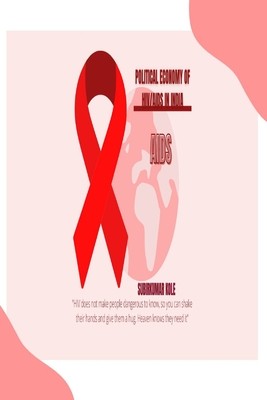
- We will send in 10–14 business days.
- Author: Subirkumar Kole
- Publisher: Self Publish
- ISBN-10: 6967168266
- ISBN-13: 9786967168267
- Format: 15.2 x 22.9 x 1.5 cm, minkšti viršeliai
- Language: English
- SAVE -10% with code: EXTRA
Reviews
Description
This dissertation takes-off from the empirical observation about the gross anomaly between the burden of HIV/AIDS epidemic and the amount of resources directed to tackle the problem both globally, and in India. Globally, HIV/AIDS with a 5 percent disease burden as measured by disability adjusted life-years consumed more than 25 percent of all health aid in 2007; and in India, with 0.3 percent prevalence rate, consumed about 18 percent of total health allocations in 2010. This dissertation explores the question, why the Indian state behaved in this particular way to contain the HIV/AIDS epidemic, whereas endemic diseases like diarrhea, dengue, infant and Aids maternal deaths causing more mortality, and a collapsing health system received little or no attention of the state? Using social constructivist theories of the study of international relations, I argue that the Indian state's behavior was shaped by a process of "norm socialization," in which the state's interest, preference, and behavior were reshaped by internalizing the principled ideas, and norms of powerful HIV/AIDS regimes. I argue that the interests and preferences of the Indian state were reconstituted from three directions: "from above," "from within," and "from below." This dissertation identifies important actors at various levels and maps out the processes through which the Indian state's preferences and behaviors were reconstituted to reflect the norms of the AIDS-regimes at the domestic level.
At the second level, this dissertation explores how norm socialization has affected two most important communities vulnerable to HIV/AIDS epidemic -- sex workers and gay men. In the first case, I examine collectivization of hitherto marginalized groups of prostitutes and their legal and political struggle of redefining prostitution as "sex work," and normalizing prostitution as "any other work," and the overall implication of such a radical proposal on the Indian society in general. In the second case, I examine India's queer rights mobilization fueled by the AIDS-money and the struggle for civil and political rights of sexually minority groups towards decriminalizing a 150-year-old statute on same-sex sexual relations. I conclude that AIDS has not only affected India's health systems in diverse ways and reshaped the national development priorities, but also brought about progressive and modern social change in India.EXTRA 10 % discount with code: EXTRA
The promotion ends in 23d.04:48:46
The discount code is valid when purchasing from 10 €. Discounts do not stack.
- Author: Subirkumar Kole
- Publisher: Self Publish
- ISBN-10: 6967168266
- ISBN-13: 9786967168267
- Format: 15.2 x 22.9 x 1.5 cm, minkšti viršeliai
- Language: English English
This dissertation takes-off from the empirical observation about the gross anomaly between the burden of HIV/AIDS epidemic and the amount of resources directed to tackle the problem both globally, and in India. Globally, HIV/AIDS with a 5 percent disease burden as measured by disability adjusted life-years consumed more than 25 percent of all health aid in 2007; and in India, with 0.3 percent prevalence rate, consumed about 18 percent of total health allocations in 2010. This dissertation explores the question, why the Indian state behaved in this particular way to contain the HIV/AIDS epidemic, whereas endemic diseases like diarrhea, dengue, infant and Aids maternal deaths causing more mortality, and a collapsing health system received little or no attention of the state? Using social constructivist theories of the study of international relations, I argue that the Indian state's behavior was shaped by a process of "norm socialization," in which the state's interest, preference, and behavior were reshaped by internalizing the principled ideas, and norms of powerful HIV/AIDS regimes. I argue that the interests and preferences of the Indian state were reconstituted from three directions: "from above," "from within," and "from below." This dissertation identifies important actors at various levels and maps out the processes through which the Indian state's preferences and behaviors were reconstituted to reflect the norms of the AIDS-regimes at the domestic level.
At the second level, this dissertation explores how norm socialization has affected two most important communities vulnerable to HIV/AIDS epidemic -- sex workers and gay men. In the first case, I examine collectivization of hitherto marginalized groups of prostitutes and their legal and political struggle of redefining prostitution as "sex work," and normalizing prostitution as "any other work," and the overall implication of such a radical proposal on the Indian society in general. In the second case, I examine India's queer rights mobilization fueled by the AIDS-money and the struggle for civil and political rights of sexually minority groups towards decriminalizing a 150-year-old statute on same-sex sexual relations. I conclude that AIDS has not only affected India's health systems in diverse ways and reshaped the national development priorities, but also brought about progressive and modern social change in India.

Reviews